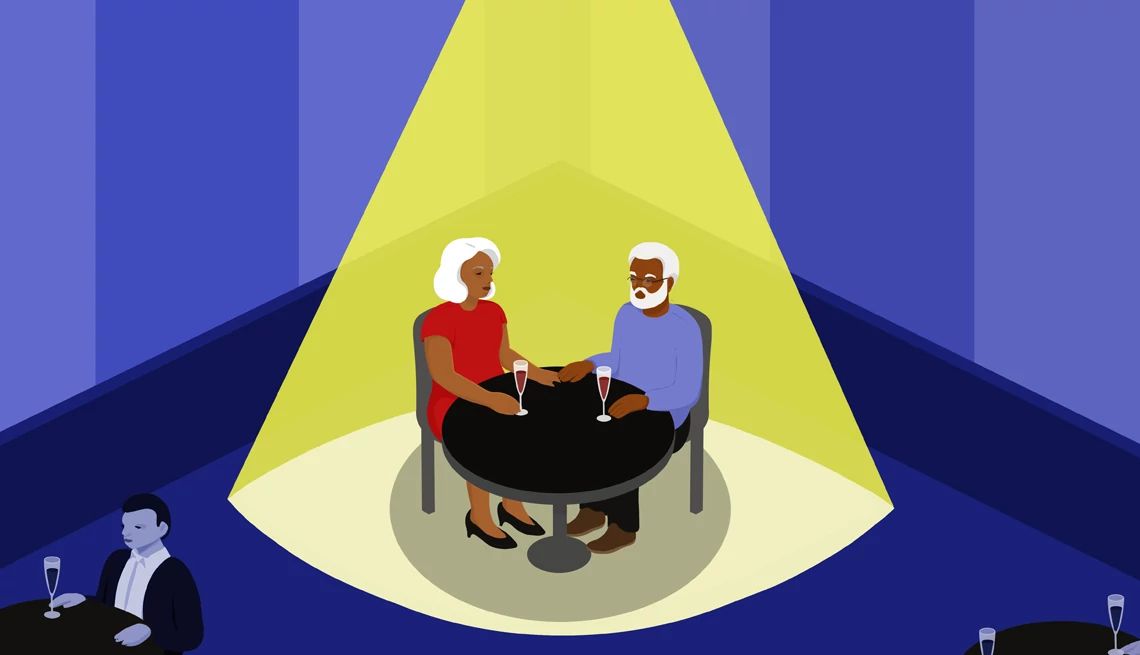AARP Hearing Center


I’ve been widowed twice — first when I was in my 30s and again in my 50s. What’s it like to date after losing a partner? Often it involves judgment — and lots of it. While I was eager to move forward, others in my life were uncomfortable with that — and said so.
In this week’s column, three sexuality experts advise a reader on how to navigate that tricky terrain. Trust me: This is a road map you’ll want to follow if you’re tired of all the “helpful comments.” And if you’re a friend or family member of someone who’s starting to date after being widowed, you’ll want to read this too.


In the Mood
For AARP’s In the Mood column, writer Ellen Uzelac will ask experts your most pressing 50+ sex and relationship questions. Uzelac is the former West Coast bureau chief for The Baltimore Sun. She writes frequently on sex, relationships, travel and lifestyle issues.
Our second question involves a common but little discussed topic: women who urinate during sex. Never heard of a waterproof love blanket? You’re about to.
My husband died a year and a half ago, and now in my 60s, I’ve started dating someone I’m excited about. However, I’m getting a lot of judgment from some friends and family members. What can I do to quash those negative vibes?
I feel you. I’m sure you’ve heard this classic line: “It’s too soon.”
But certified sex therapist Sandi Kaufman points out there’s no “right or wrong” timetable when it comes to dating after the death of a partner — just as there’s no set time frame for experiencing grief. Often, says Jane Fleishman, who holds a PhD in human sexuality from Widener University’s Center for Human Sexuality Studies, the judgment, hurtful as it is, isn’t about you but them.
Invite them to express themselves — with boundaries. Explore their feelings with them, Fleishman says, but do not allow them to keep you from pursuing your own excitement and pleasure.
Understand they are dealing with their own grief. One possibility is that they are projecting their pain over the death of your husband on to you, according to Kaufman.
“Check in with them about their grief process,” Kaufman says, and if the person who has issues with you dating is struggling with grief, gently suggest family or individual counseling. “Hopefully, when addressed like this, these people can put aside their fears and any negative opinions,” Kaufman says.
Hear what they’re really saying. Take a moment to consider that some friends and family are accustomed to relating to you as part of a couple — and now that you are single and dating again, they are uncomfortable with this “new you,” Fleishman says.
If they are still partnered, she adds, they may have a difficult time imagining themselves finding new sexual pleasure or intimacy later in life, as you are doing. “Again, there’s a shift in the dynamic that results in friends judging you,” according to Fleishman.
Have your say. Tell people how you feel and what you want, says sexuality educator Joan Price, author of Sex After Grief: Navigating Your Sexuality After Losing Your Beloved.
Among the conversation starters Price suggests: “I can still love and mourn my husband and be open to new connections” and “My beloved would not have wanted me to be alone, lonely and bereft for the rest of my life.”





































































You Might Also Like
Can You Orgasm Without an Erection, and Is It Possible to Masturbate Too Much?
We ask experts the questions you’re too embarrassed to askI Can’t Have Sex With My Wife Because of Prostate Cancer. What’s Next for Us?
Plus a woman asks why sex is uncomfortable and burns afterwardsRecommended for You